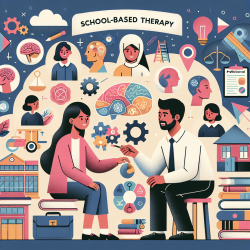Speech Therapy in Schools: Empowering Our Children Through Online Therapy
In the rapidly evolving landscape of education and healthcare, online therapy has emerged as a revolutionary approach, particularly in the realm of speech therapy in schools. As government health regulators, it's crucial to understand how these services can be integrated effectively to enhance community well-being and improve outcomes for our children.
The Rise of Online Therapy
Online therapy, or teletherapy, has become increasingly popular, especially in schools. It offers a flexible, accessible solution for students who need speech therapy but may face barriers such as geographical location or resource limitations. By leveraging technology, we can ensure that every child receives the support they need, regardless of their circumstances.
Data-Driven Decisions for Better Outcomes
At TinyEYE, we are committed to making data-driven decisions to ensure the best outcomes for children. By analyzing data from our online therapy sessions, we can identify trends, measure progress, and tailor interventions to meet the unique needs of each student. This approach not only enhances the effectiveness of therapy but also provides valuable insights for policymakers.
Benefits of Online Speech Therapy
Online speech therapy offers numerous benefits that extend beyond individual students to impact the entire community:
- Accessibility: Students can access therapy sessions from any location, reducing the need for travel and minimizing disruptions to their school day.
- Consistency: Regular sessions are easier to schedule and maintain, leading to more consistent progress and better long-term outcomes.
- Customization: Therapists can tailor sessions to the specific needs of each student, ensuring that interventions are both effective and engaging.
- Community Involvement: Parents, teachers, and other stakeholders can be more actively involved in the therapy process, fostering a supportive environment for the child.
Community and Policy Implications
For government health regulators, the rise of online therapy presents an opportunity to rethink traditional approaches to speech therapy in schools. By supporting policies that encourage the integration of online therapy, we can create a more inclusive and effective system that benefits all children.
Furthermore, by involving the community in the therapy process, we can build a network of support that extends beyond the classroom. Parents and teachers can collaborate with therapists to reinforce skills and strategies, creating a cohesive approach that maximizes the child's potential.
Conclusion
As we continue to navigate the challenges and opportunities of modern education and healthcare, online therapy stands out as a promising solution. By making informed, data-driven decisions, government health regulators can help shape policies that support the integration of online speech therapy in schools, ultimately empowering our children and strengthening our communities.
At TinyEYE, we are passionate about creating great outcomes for children through innovative, evidence-based approaches. We invite you to join us in this journey to transform speech therapy in schools and build a brighter future for all.










